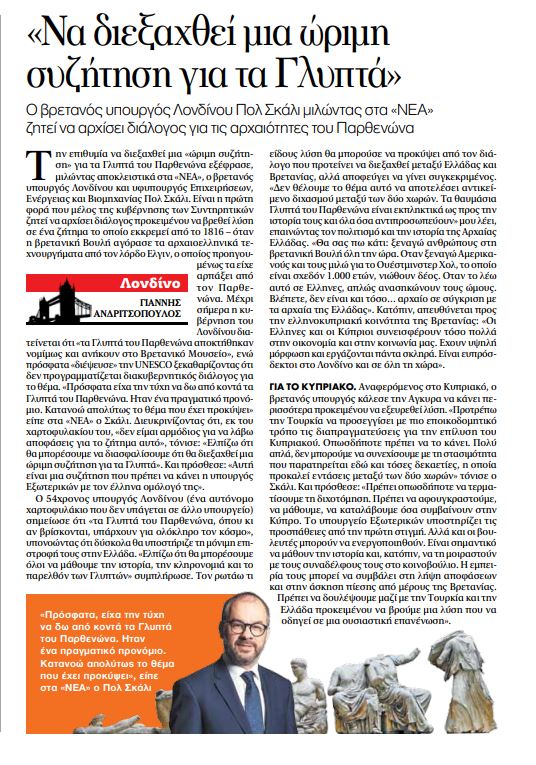Paul Scully, Minister of State at the Department for Levelling Up, Housing and Communities and Minister for London, was interviewed by Yannis Andritsopoulos, UK Correspondent for Ta Nea, and calls for dialogue to begin on the continued division of the Parthenon Sculptures.
The UK Minister called for a "mature discussion" on the matter.
This is the first time that a member of the Conservative Government has called for dialogue to be initiated in order to find a solution to an issue that has been pending since 1816, and since the time when British Parliament bought the ancient Greek artifacts from Lord Elgin, who had previously removed them from the Parthenon.
To this day, the UK Government claims that "the Parthenon Sculptures were legally acquired and belong to the British Museum", while it recently "refuted" UNESCO's ICPRCP decision for intergovernmental dialogue on the issue.
"Recently I was lucky enough to see the Parthenon Sculptures up close. It was a real privilege. I fully understand the issue that has arisen," commented Paul Scully .
Clarifying that, from his portfolio, "I am not in the right department to take decisions on this issue", he stressed: "I hope that we will be able to ensure that there will be a mature discussion on the Sculptures". He added: "This is a discussion that the Foreign Minister should have with her Greek counterpart."
The 54-year-old Minister (holds an autonomous portfolio that does not come under another ministry) noted that "the Parthenon Sculptures, wherever they are, exist for the whole world", implying that he would hardly support their permanent return to Greece. "I hope that we will all be able to learn the history, heritage and the past of these sculptures", he added.

Yannis Andritsopoulos asked him what kind of solution could emerge from the dialogue he proposes to take place between Greece and Britain, and MP Scully replied: "We do not want this issue to be the subject of a division between the two countries. The wonderful Parthenon Sculptures are amazing in terms of their history and everything they represent", he tells me, praising the culture and history of Ancient Greece.
"I'll tell you something: I've been guiding people around the British Parliament all the time. When I tour Americans and talk to them about Westminster Hall, which is almost 1,000 years old, they are in awe. When I say this to Greek visitors, they just shrugg their shoulders. You see, it's not that ancient whencompared to the ancients of Greece."
He then addresses the Greek Cypriot community in Britain: "Greeks and Cypriots contribute so much to our economy and society. They are highly educated and always hard workinf. They are welcome in London and across the country."
ON THE CYPRUS ISSUE. Referring to the Cyprus problem, the British minister called on Ankara to do more in order to find a solution.
"I urge Turkey to find a constructive approach and a way forward for the negotiations for the settlement of the Cyprus' division. It definitely has to do this. Quite simply, we cannot continue with the stagnation that has been observed for so many decades, which is causing tensions between the two countries," Paul Scully stressed.
He added: "We absolutely must end the partition. We have to listen, to learn, to understand what is happening in Cyprus. The Foreign Ministry has been supporting the efforts from the very beginning. But members can also be active. It is important that they learn the story and then share it with their colleagues in parliament. Their experience can contribute to decision-making and pressure from Britain. We must work together with Turkey and Greece in order to find a solution that leads to a meaningful reunification."
To read the article in Ta Nea, follow the link here .

BCRPM also notes the breakthrough decision negotiated by the Greek team, after the initiatve of the representative of the Greek Ministry of Foreign Affairs. This decision adopted by UNESCO's ICPRCPis an excellent example of the preparation invested by Greece in the continued efforts to find a solutuon to the unecessary division of the Parthenon sculptures. Just two weeks ago a celebration of the 13th anniversary of the Acropolis Museumwas organised by BCRPM and Greeks in the UK, at the British Museum. Victoria Hislop, Professor Edith Hall, George Gabriel and Marlen Godwin, members of BCRPM joined Avgoustinos Galiassos and supporters to ask that the Parthenon Marbles be reunited in Athens.